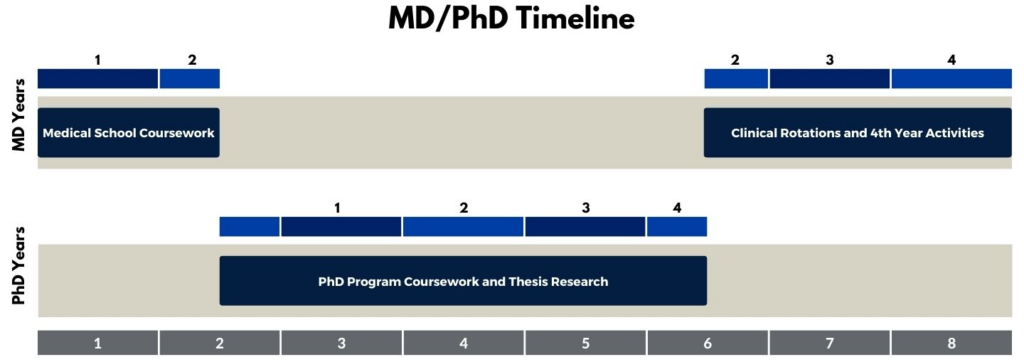M.D./Ph.D. Program
The M.D./Ph.D. Interdisciplinary Program in Neuroscience combines the medical training of Georgetown University School of Medicine with the research expertise of the IPN. Alumni may work in clinical settings, labs, or both, benefiting from a deep understanding across the worlds of care and research.
About the Program
The M.D./Ph.D. Interdisciplinary Program in Neuroscience requires students to complete 19 credits in core neuroscience courses, compared to the 34 credits required for Ph.D. students. The remaining credits are earned through medical coursework. M.D./Ph.D. students are excused from the normal requirement of 11 IPN elective credits – though they may take electives if they wish – and do not take NSCI 5004 Neurobiology of Disease or NSCI 5008 Organization of the Nervous System, which are covered by the medical curriculum.
Find more information about Georgetown’s M.D./Ph.D. programs on the School of Medicine website.
M.D./Ph.D. Course Schedule

After M1
Summer 0
| Course Name | Credit(s) |
|---|---|
| NSCI 9985 NSCI Lab Rotation – Summer | 0 (Pass/Fail) |
| 0 Credits |
- Sign up to take the required Initial General Laboratory Safety Training Course before July 1.
- Review the BGE New Student Checklist – see IPN New Students for more information.
- Attend the mandatory BGE Summer Orientation.
- Review the requirements and expectations of Lab Rotations.
- Send a Post-Rotation Form to the head of the Student Advisory Committee (SAC) for your first rotation.
Fall 0
M.D./Ph.D. students are enrolled in the School of Medicine (SOM) for M2.
Spring 0
M.D./Ph.D. students will be officially enrolled in graduate school. However, they are not expected to actually begin their rotation until they have taken the USMLE STEP 1 board exam. M.D./Ph.D. students are required to take STEP 1 by the same deadline as students in the regular M.D. program.
| Course Name | Credit(s) |
|---|---|
| NSCI 9986 NSCI Lab Rotation – Spring | 0 (Pass/Fail) |
| 0 Credits |
- Send a Post-Rotation Form to the head of the SAC for your second rotation.
- Give a Student Seminar Series talk about your second rotation.
Year 1 of Ph.D.
Summer 1
| Course Name | Credit(s) |
|---|---|
| NSCI 8001 Experiences in Neuroscience | 0 |
| NSCI 9986 NSCI Lab Rotation – Summer | 0 (Pass/Fail) |
| 0 Credits |
- Attend the mandatory IPN orientation.
- Send a Post-Rotation Form to the head of the SAC for your third rotation.
- Choose a thesis lab.
- Register for Fall courses and thesis research.
Fall 1
| Course Name | Credit(s) |
|---|---|
| INNS 6500 Basic Neuroscience I | 4 |
| NSCI 5001 Neuroscience Survey I | 2 |
| NSCI 5003 Critical Readings I | 1 |
| NSCI 5009 Practical Data Analysis & Experimental Design | 2 |
| NSCI 6510 Advanced Neuroscience I | 2 |
| 11 Credits |
Spring 1
| Course Name | Credit(s) |
|---|---|
| NSCI 5005 Systems & Cognitive Neuroscience | 5 |
| NSCI 5006 Critical Readings II | 1 |
| NSCI 5007 Survey Skills & Ethics for Science | 2 |
| NSCI 9999-03 Thesis Research | 0 |
| 8 Credits |
- Take the Written Comprehensive Exam before the end of Year 1.
- Register for Summer thesis research.
Year 2 of Ph.D.
Summer 2
| Course Name | Credit(s) |
|---|---|
| NSCI 9999-01 Thesis Research | 0 (Pass/Fail) |
| 0 Credits |
- Choose you oral exam committee members and schedule your Oral Exam.
- Register for Fall thesis research.
Fall 2
| Course Name | Credit(s) |
|---|---|
| NSCI 9999-01 Thesis Research After Fall 2, you will be automatically registered for Thesis Research (NSCI 9999) courses. | 0 (Pass/Fail) |
| 0 Credits |
- Organize your thesis committee and get SAC approval by December.
- Full-time Thesis Research.
- Give your annual Student Seminar Series talk.
- Set up the first meeting with your thesis committee and bring the completed Thesis Proposal form for approval.
Years 2-4 of Ph.D.
- Meeting with your thesis committee.
- Expect to submit your first manuscript before the end of Year 3.
- Follow the steps to complete your degree.
- In your second-to-last semester: Follow the Graduating Student Checklist to apply for graduation.
- Receive your degree and attend Commencement.
- Register with SOM for Spring 4.
Completion of Degree
Present and defend your dissertation, and apply for graduation.